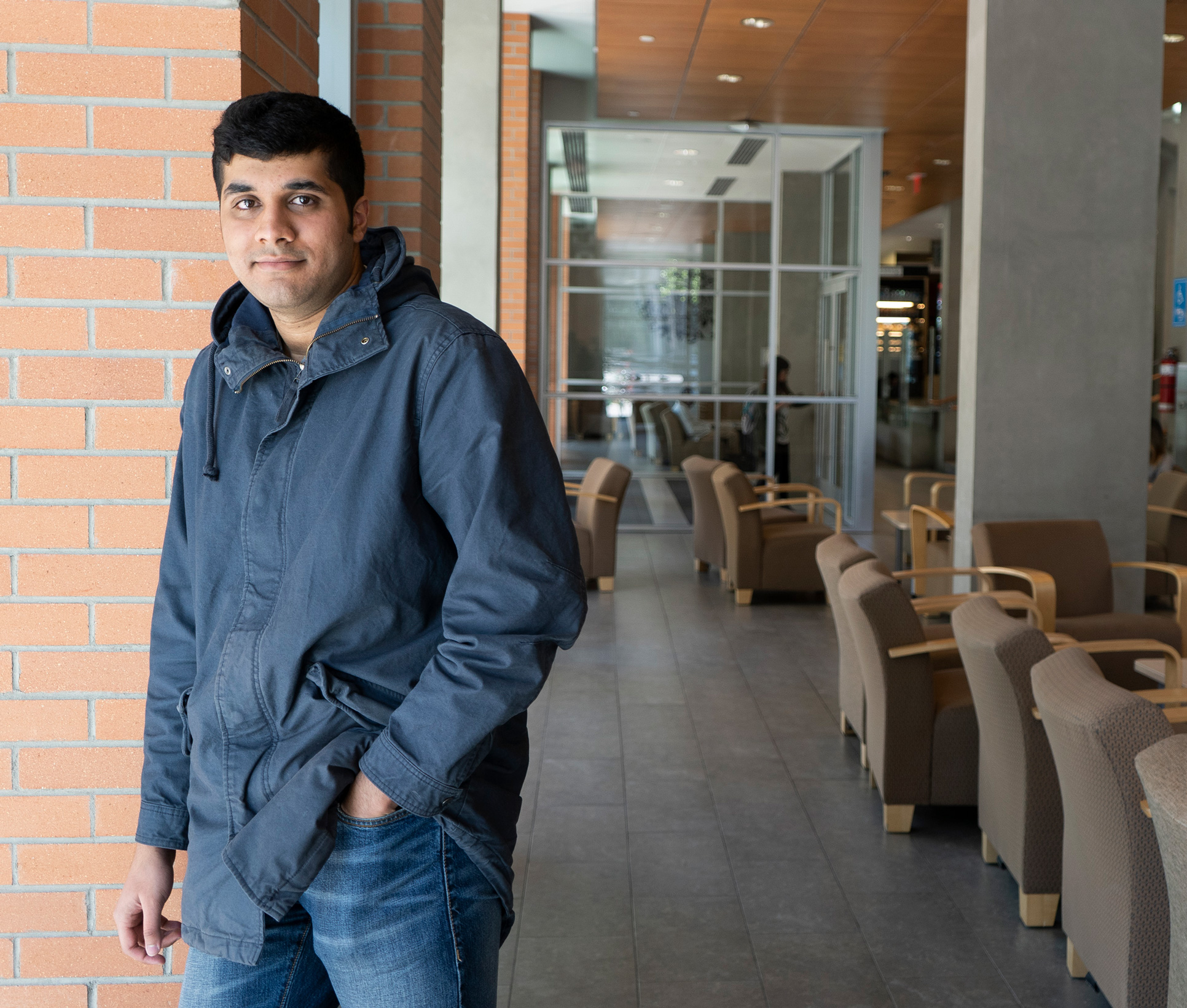)
The student perspective
It was the end of January when Rebecca Routly and her peers noticed something that would change the course of their clinical placement.
At the acute care hospital where the five Practical Nurse Diploma students were placed they observed that individuals with dementia would often become agitated.
So, the students — which included Rebecca, Rachel Beyer, Venessa Grande, Alyssa Pannu, and Christina Sevkovic — gave the patients living with dementia an activity to keep them occupied, they also visited with them, and they noticed the patients seemed to be more calm.
While the students were doing their clinical, Practical Nurse instructors Brenda Humphries and Carolyn Vacey had a conversation where they realized the students’ observation could lead to a presentation topic the group could submit to a professional nursing annual general meeting and conference. That’s when the two instructors and five students agreed to modify the intended clinical activity in favour of developing a presentation for the College of Licensed Practical Nurses of Alberta (CLPNA) event.
On May 7, Rachel, Alyssa, and Rebecca presented to approximately 200 licensed practical nurses and other health professionals. They were the only learner group chosen to present. On behalf of the group, they spoke about the different approaches to, and models of, dementia care that have emerged in recent years, along with analyses of similarities that offer real world nursing application consistent with all approaches and models. An approach is practical and consists of real-world actions health care providers can take to manage care challenges. A model is theoretical and guides health care professionals when deciding on care. There were three approaches:
The Supportive Pathways program, where residents with dementia are acknowledged as unique individuals by creating supportive, homelike care environments;
The Best Friends approach, which suggests that what a person with dementia needs most of all is a “best friend,” which can be a family member, friend, or staff member who empathizes with their situation, remains loving and positive, and is dedicated to helping the person feel safe, secure, and valued;
Gentle Persuasive Approaches, a person-centred, compassionate care approach with a focus on responding respectfully and with confidence and skills to behaviours associated with dementia (Bow Valley College’s School of Continuing Learning offers a Gentle Persuasive Approaches course).
The students also covered one model: the Butterfly Care Home Program, whose premise is to develop a culture of caregivers that exemplify compassion and humanness in the often industrial and medical model found in long term care. Care homes that implement the model go through a one-year culture change program that includes training staff in person-centred care, such as getting to know patients the way they’d get to know anyone in life, and transforming the facility into a real home.
Rebecca says the group’s number one takeaway from the project is that every single person living with dementia is different. Each individual needs different care, each needs their own routine. “The biggest thing is that every behaviour and voiced concern from the individual has an underlying meaning. Though most of them can't verbally say what is wrong, they are presenting it to you. You just have to figure it out.”
As for speaking at the conference, she says she and her peers appreciated the CLPNA’s welcoming reception. “[The CLPNA] was so excited to have students come and present. We were very nervous; we are students and some of them have been nursing for 30, 40 years, but they were so welcoming.”
Many of the LPNs congratulated the group, with one saying they may have a future as keynote speakers.
Their clinical coordinator Abbie Kranz says that these students have a healthy perspective when understanding the care needs for the person with dementia.
Other group members add that’s because as students, they’re a fresh set of eyes, and they only have three patients at once compared to the six or seven that the LPNs have. “We had more time to sit and talk with them,” says Rebecca.
Since the conference, the group members feel more confident about their public speaking skills and have an outstanding addition to their résumé. And if dementia care is in their career plans, they’ve got a leg-up. “It gives us a very big step towards [the field] if we decide to go that way,” says Rebecca.
Want to discover what other leadership qualities you will learn for your career as a nurse? Visit our program page.
Posted on July 3, 2019
Story by Julie-Anne Cleyn, photos by Chris Bolin
At the acute care hospital where the five Practical Nurse Diploma students were placed they observed that individuals with dementia would often become agitated.
So, the students — which included Rebecca, Rachel Beyer, Venessa Grande, Alyssa Pannu, and Christina Sevkovic — gave the patients living with dementia an activity to keep them occupied, they also visited with them, and they noticed the patients seemed to be more calm.
While the students were doing their clinical, Practical Nurse instructors Brenda Humphries and Carolyn Vacey had a conversation where they realized the students’ observation could lead to a presentation topic the group could submit to a professional nursing annual general meeting and conference. That’s when the two instructors and five students agreed to modify the intended clinical activity in favour of developing a presentation for the College of Licensed Practical Nurses of Alberta (CLPNA) event.
On May 7, Rachel, Alyssa, and Rebecca presented to approximately 200 licensed practical nurses and other health professionals. They were the only learner group chosen to present. On behalf of the group, they spoke about the different approaches to, and models of, dementia care that have emerged in recent years, along with analyses of similarities that offer real world nursing application consistent with all approaches and models. An approach is practical and consists of real-world actions health care providers can take to manage care challenges. A model is theoretical and guides health care professionals when deciding on care. There were three approaches:
The Supportive Pathways program, where residents with dementia are acknowledged as unique individuals by creating supportive, homelike care environments;
The Best Friends approach, which suggests that what a person with dementia needs most of all is a “best friend,” which can be a family member, friend, or staff member who empathizes with their situation, remains loving and positive, and is dedicated to helping the person feel safe, secure, and valued;
Gentle Persuasive Approaches, a person-centred, compassionate care approach with a focus on responding respectfully and with confidence and skills to behaviours associated with dementia (Bow Valley College’s School of Continuing Learning offers a Gentle Persuasive Approaches course).
The students also covered one model: the Butterfly Care Home Program, whose premise is to develop a culture of caregivers that exemplify compassion and humanness in the often industrial and medical model found in long term care. Care homes that implement the model go through a one-year culture change program that includes training staff in person-centred care, such as getting to know patients the way they’d get to know anyone in life, and transforming the facility into a real home.
Rebecca says the group’s number one takeaway from the project is that every single person living with dementia is different. Each individual needs different care, each needs their own routine. “The biggest thing is that every behaviour and voiced concern from the individual has an underlying meaning. Though most of them can't verbally say what is wrong, they are presenting it to you. You just have to figure it out.”
As for speaking at the conference, she says she and her peers appreciated the CLPNA’s welcoming reception. “[The CLPNA] was so excited to have students come and present. We were very nervous; we are students and some of them have been nursing for 30, 40 years, but they were so welcoming.”
Many of the LPNs congratulated the group, with one saying they may have a future as keynote speakers.
Their clinical coordinator Abbie Kranz says that these students have a healthy perspective when understanding the care needs for the person with dementia.
Other group members add that’s because as students, they’re a fresh set of eyes, and they only have three patients at once compared to the six or seven that the LPNs have. “We had more time to sit and talk with them,” says Rebecca.
Since the conference, the group members feel more confident about their public speaking skills and have an outstanding addition to their résumé. And if dementia care is in their career plans, they’ve got a leg-up. “It gives us a very big step towards [the field] if we decide to go that way,” says Rebecca.
Want to discover what other leadership qualities you will learn for your career as a nurse? Visit our program page.
Posted on July 3, 2019
Story by Julie-Anne Cleyn, photos by Chris Bolin




